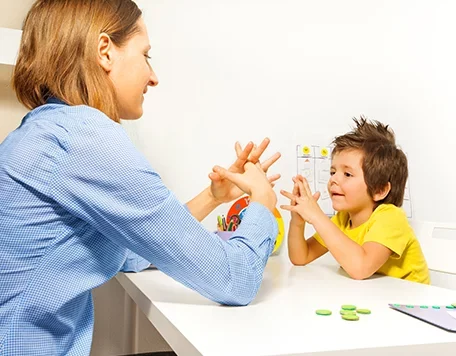Applied Behavior Analysis, short-form – ABA therapy is a therapeutic method that is used all across the world to treat children who are diagnosed with autism. This is a specifically designed and evidence-based therapy. It chiefly focuses on improving specific behaviors like communication, social skills and overall learning of a child.
If any child undergoes ABA therapy, the involvement of parents is really important. This is because parents equally take part in the therapy program to understand how the therapy is designed, its objective and how to implement the therapy-based exercises at home. The more the child gets support, the faster they can improve.
We will understand how parents can support and enhance the goals of ABA therapy for their children dealing with ASD or autism.
Let’s Understand ABA Therapy
See, autistic children often have problematic behaviors. ABA therapy uses several techniques to teach positive behaviors to children. And, it also reduces unwanted behaviors.
The therapist prefers a structured approach to this therapy. In other words, the therapy basically breaks down the tasks into smaller steps.
We will try to understand how a task is broken down into smaller steps with an example –
Suppose, the task is teaching the kid how to brush their teeth. First, the therapist will ask the child to pick up the toothbrush first. With continuous teaching, when the child can do this consistently, then the therapist will tell the kid to do the next step – putting toothpaste on the brush. The child will then learn how to squeeze the toothpaste onto the toothbrush. When the child is able to do that, the therapist will teach the child about tje right motion for brushing their teeth. The next step is rinsing the mouth. Finally, the child learns to rinse their mouth and put the toothbrush away. You can see how each of these steps is taught individually. And, the child receives praise or a small reward for completing each step successfully.
The Importance of Parents’ Involvement in ABA Therapy
Parents are important for the success of ABA therapy. Here are some ways parents can support their children –
As you may know, children with autism progress on routine and consistency. Parents can follow the same strategies at home that are used in therapy. This consistency can reinforce learning and positive behaviors among children.
Parents can maintain regular communication with therapists. They can take a look at their child’s progress and any challenges their kids face. This even helps therapists to readjust or redesign the therapy plan as needed.
Children with ASD should be encouraged and praised for their efforts. This positive reinforcement helps children feel motivated and valued. So, parents can use different types of rewards like stickers, small treats or extra playtime to encourage good behavior.
Remember, a supportive home environment is a must for the success of ABA therapy. So, parents must bring out a positive atmosphere at home. They can set up a daily routine that includes time for therapy, play and rest. They can also use visual aids like charts, schedules and picture cards(as suggested by the therapists) to help children understand different types of tasks and routines. Visual support makes the whole communication easier and reduces anxiety. And, remember, the home space should be free from distractions.
Some More Words for Parents
Parents, we know, that sometimes, you may face challenges while supporting your child’s ABA therapy. Do not get driven by others or any kind of negativity. You need to stay patient and persistent.
Children with autism have challenging behaviors. You should work with therapists to understand the reasons behind these behaviors. Understanding reasons will help you remain calm and utilize the best strategies to address them.
ABA therapy can not offer an improvement overnight. It is about significant time commitment. You should also plan and allocate time for therapy sessions and practice at home.
Bottom Line
When children Undergo therapy, it can be overwhelming. But when you have the board-certified and most experienced therapists and doctors by your side, it can be less stressful and more result-driven.
Hope AMC is here for you! We offer one-of-a-kind ABA therapy for children with Autism in Dubai. Our clinic is open every day of the week. And, we have board-certified, knowledgeable and highly experienced ABA therapists on our team.
Visit our clinic today! Or, book an appointment first!
For more information do visit our facebook page!






